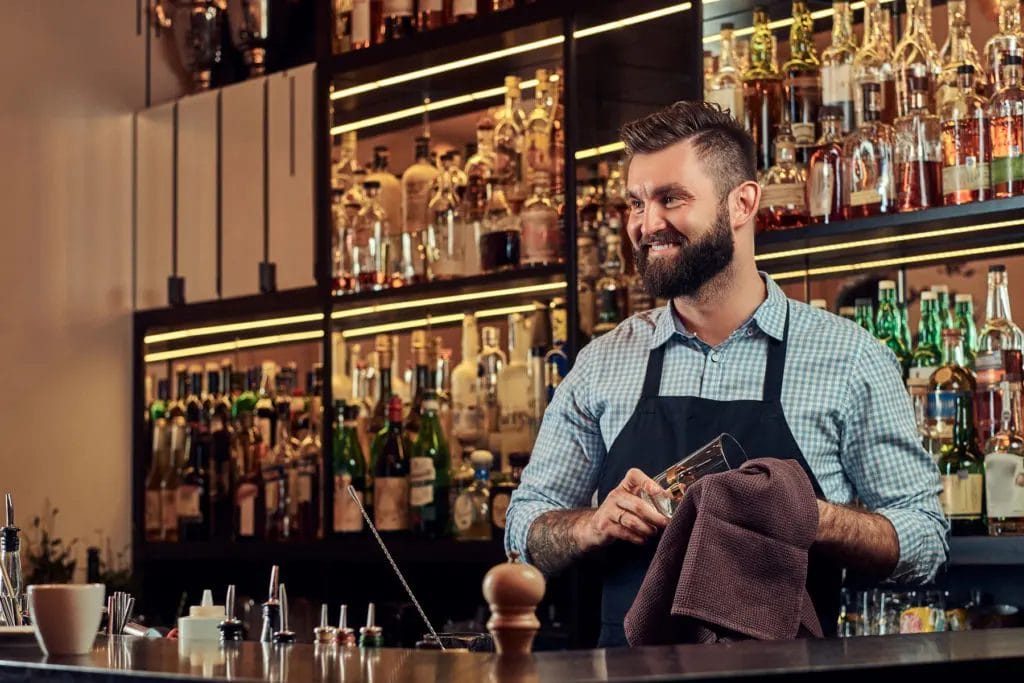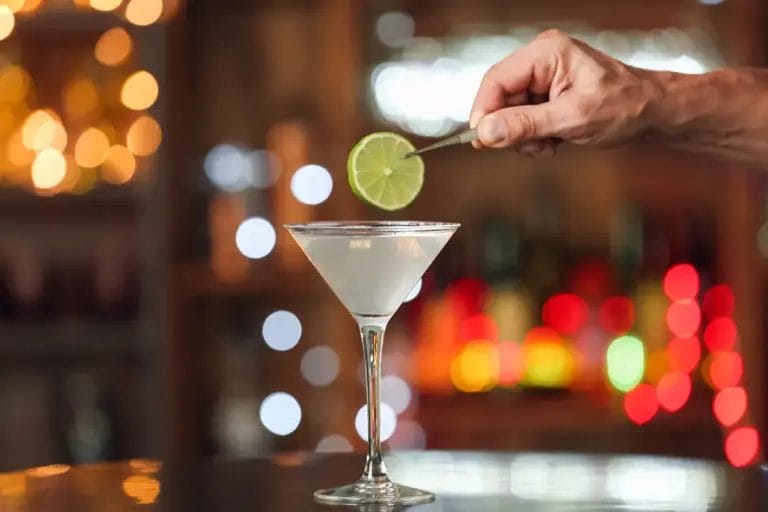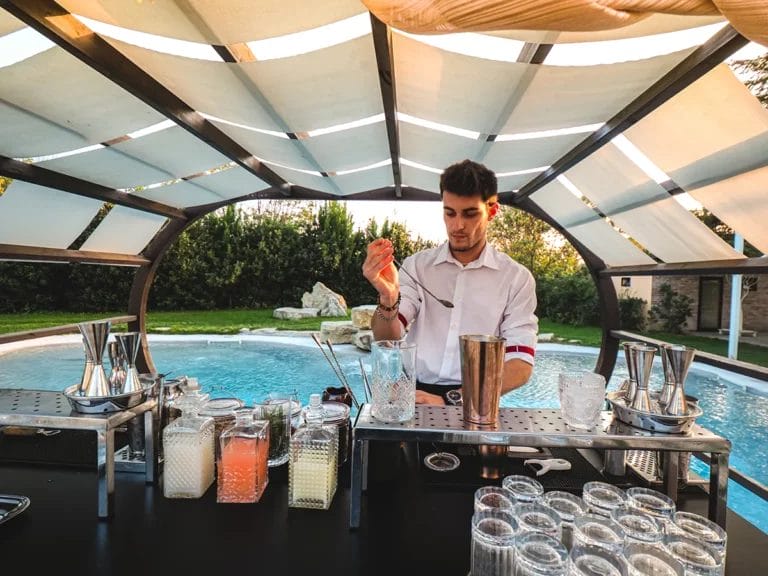Being an awesome bartender is more than just mixing a mean Old Fashioned.
While building a business plan and getting industry experience are essential, your soft skills set you apart from your competition.
The most important bartender customer service skills include:
- Communication
- Time Management
- Strong Memory
- Organization
- Composure
Understanding your personality and innate abilities is the first step toward becoming the absolute best at what you do. These skills allow you to provide world-class service and prepare you for any challenges that may come your way.
The Customer Service Traits Every Bartender Needs
Whether you were born with the gift of gab or blessed with a knack for organization, your skills can help you provide excellent customer service as a bartender.
Communication
Communication is key for just about any job, but especially for a career in bartending where you might interact with hundreds of people a day.
Being a strong communicator goes beyond just carrying on a conversation. A big part of strengthening your bartender skills is learning how to effectively communicate with customers, clients, and coworkers. The best ways to do this include:
- Listening actively: The best communicators know how to listen. Whether it’s a patron with a very specific order or a manager sharing a new policy, bartenders must hear and understand the people they interact with.
- Being clear and concise: When you have a packed bar and a stack of orders, you don’t have time to repeat yourself or re-explain things. Speaking as clearly and concisely as possible helps save time and keeps everybody on the same page.
- Understanding tone: An awareness of tone is especially important for bartenders. Even if you’re stressed out, you still need to sound friendly and calm. Many misunderstandings can result from unintentionally harsh language or an impatient reply.
- Having a positive attitude: Even if you’re having a bad day, your customers shouldn’t know it. This can be a challenge! Try to approach every interaction with fresh eyes and a positive outlook so you put your best foot forward.
- Exuding a friendly demeanor: It may sound cliche, but don’t forget to smile! A friendly face puts people at ease and makes them more likely to respond in kind.
Maintaining strong communication is a crucial bartender skill since so much of the job involves interacting with the public. Practicing patience and positivity creates a better customer service experience for guests and helps you build a strong reputation.

Time Management
It’s no secret that bartenders need to juggle multiple tasks in a timely manner. At any given moment, you could be managing drink orders, helping customers cash out, restocking supplies, and cleaning your equipment.
This is why time management is one of the most important skills for a bartender to possess. Prioritizing, delegating, and completing tasks allows you to do your job efficiently. If you don’t plan accordingly, you could be caught in the weeds at the worst possible time.
For example, if you know that the hours between 2:00 and 5:00 p.m. are slow, that’s the time to clean, restock, and do prep work so that you’re ready to go when customers start pouring in.
Or, knowing how to accurately mix multiple cocktails at once can be a huge timesaver, allowing you to serve multiple customers in the time it takes to mix a single drink.
If you don’t have a natural talent for managing your time, try making checklists and setting reminders to keep you on task. Create a list on a whiteboard behind the bar, or try a checklist and reminder app like Google Keep or Notion to help you schedule your day.
Effectively managing your time allows you to prepare drinks quickly and give customers the attention they need when it matters most.

Strong Memory
There’s plenty to remember when you’re working behind the bar. While you can use tools and systems for to-do lists, inventory, and even drink recipes, nothing can replace the importance of brainpower.
Many memory-based skills improve as you build on your bartender experience, such as ratios for the most popular drinks or sanitation procedures. The longer you’re in the industry, the more you can rely on muscle memory to get the job done.
A strong memory can also help you score points with your customers. Small details like remembering a patron’s favorite drink before they ask or knowing their name when they return for another cocktail go a long way when it comes to customer satisfaction.
Organization
If you want to offer the best customer service possible, organization is a must. This is true for every bartender, and especially for those who want to start an event bartending business.
From setting up your station to keeping track of bookings, excellent organization is the key to success.
Some of the most essential organizational skills for a bartender include:
- Bar layout: Maintain a neat and well-stocked station with all of your bottles, mixers, and ingredients within arm’s reach.
- Prep work: Cut up garnishes and fill containers ahead of busy times so you have everything you need to mix drinks.
- Cleaning schedule: Post and maintain a rigorous cleaning schedule to ensure your bar is sanitary, compliant, and ready for the next shift.
- Tracking orders: Keep careful track of drink orders. If they print out on a receipt, use a food ticket holder to post them in the order they come in. Better yet, a point-of-sale (POS) that features a digital kitchen display system can track and organize them for you.
- Handling sales: Ensure accuracy and save yourself a lot of time with a POS system for your bar. This is useful for handling payments from both patrons and clients who hire you for private events.
- Scheduling events: Book your mobile bartending gigs through software like SimplyBook.me or Calendly to keep your calendar organized.
- Managing paperwork: File all of your important paperwork — like contracts, invoices, and tax documents — so you can easily find them. An electronic filing system is a great way to stay on track.
Customers recognize and appreciate the streamlined and efficient service an organized bartender provides.

Composure
Working under pressure is a big part of bartender customer service. Serving multiple guests, filling orders for servers, and keeping your workstation clean and stocked can make you feel like you’re running in circles.
If you get overwhelmed, guests will notice and may get frustrated, creating a vicious and stressful cycle.
Of course, you’re human! Effectively managing stressful shifts doesn’t always come naturally, it takes practice and mindfulness. Try these techniques to help you stay calm, cool, and collected, no matter how busy your bar gets:
- Breathe. It’s easy to rush from one task to the next without pause, but sometimes giving yourself just 10 seconds to take a deep breath can help calm your mind.
- Rely on your training. You know what you’re doing, but it’s easy to forget that when you have requests flying at you left and right. Lean into your experience to guide you.
- Have a script. Develop some go-to phrases that you can rattle off automatically, like, “I’ll be right with you!” or, “You’re next in line!” These can prevent you from snapping unintentionally and convey a friendly acknowledgment to guests.
- Give yourself time. While a busy shift may not always allow for a break, take a moment to decompress when there are lulls or after closing time. Staying calm is tough if you can’t take care of yourself.
Keeping a calm demeanor gives customers confidence in your ability to offer the best service possible. You appear more professional and knowledgeable when you don’t buckle under pressure.
How to Handle Conflict While Bartending
Just like any service industry job, bartenders can face their fair share of conflict. When you add alcohol into the mix things can get even more complicated.
A proactive approach is always best. Identifying and addressing issues before they escalate can help ensure that everybody remains calm, allowing you to resolve potential conflict before it even starts.
For instance, if you have a customer who returns to the bar for multiple drinks, offer them water and snacks to accompany their cocktail. This prevents them from drinking too much too fast and potentially being cut off.
Sometimes conflict can arise between patrons after they’ve had a few too many. After all, bar fights aren’t unheard of. Always observe your customers when they order drinks and after they walk away. If you notice conversations getting heated, ask security to step in before they escalate.
If a customer is dissatisfied with their order or your service, do your best to make it right. Offer a replacement drink or refund (as long as the bar policy and regulations allow it).
At the end of the day, most people want to feel like they’ve been seen and heard, so the best way to handle conflict or complaints is to listen closely and respond accordingly.

Boost Your Professionalism by Being Licensed and Insured
Sometimes showing your customers you care goes beyond your skill set. Running your business responsibly and safely demonstrates that you’re a real pro.
The first step is obtaining the proper licensing and certifications required to serve and sell alcohol in your region. These laws vary by state, so check with your local agency before you get to work.
If you operate as an independent event bartender, you’ll need to choose a business name, apply for an EIN, and register with the state. Once you’ve completed these steps, you can determine local liquor licensing requirements.
You also need bartender insurance to protect your business. Even with the best bartending skills on your resume, accidents can still happen. This coverage safeguards your business when the unexpected occurs.
If you accidentally serve an intoxicated patron or an underage guest who goes on to injure somebody or cause property damage, you can be held liable. Your liquor liability policy offers a financial safety net that allows you to operate with confidence.
Make sure to post your license, registration, and insurance credentials wherever you work to show customers that you are a professional who values their safety.
Elevate Your Bartender Customer Service to the Next Level
Becoming the best bartender you can be comes down to understanding your strengths and leveraging them to their fullest potential.
If you recognize areas that you can improve, that’s okay! It’s an opportunity to build on your already impressive resume of bartender skills.





